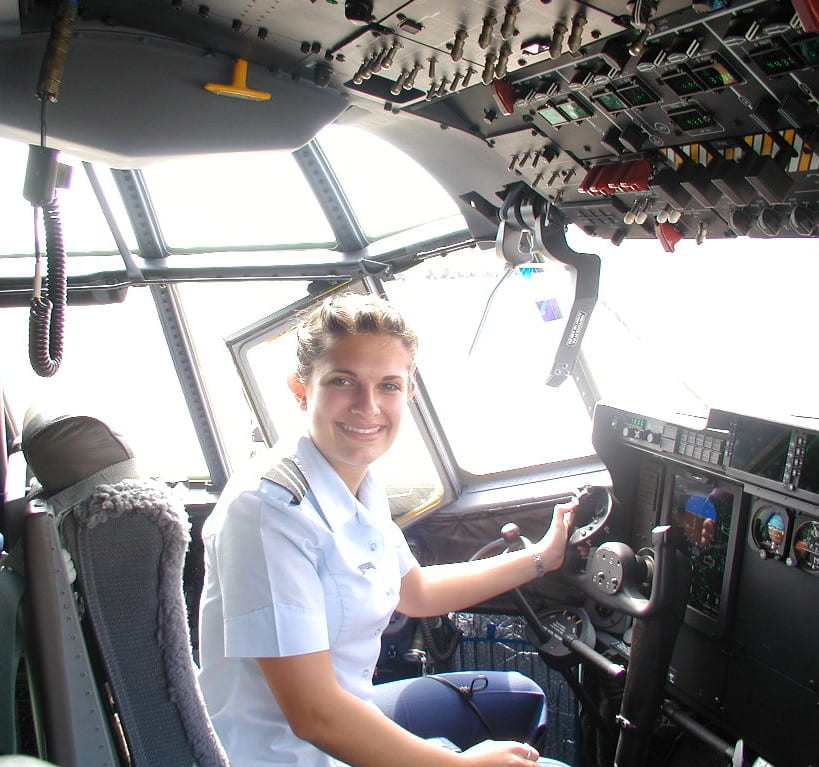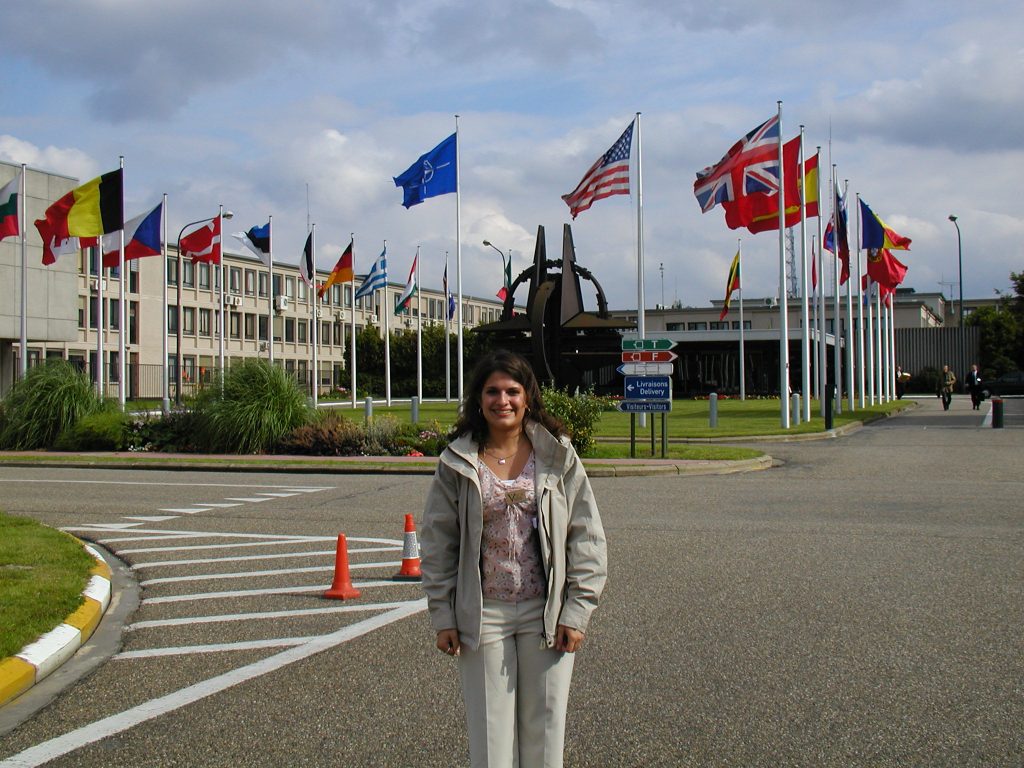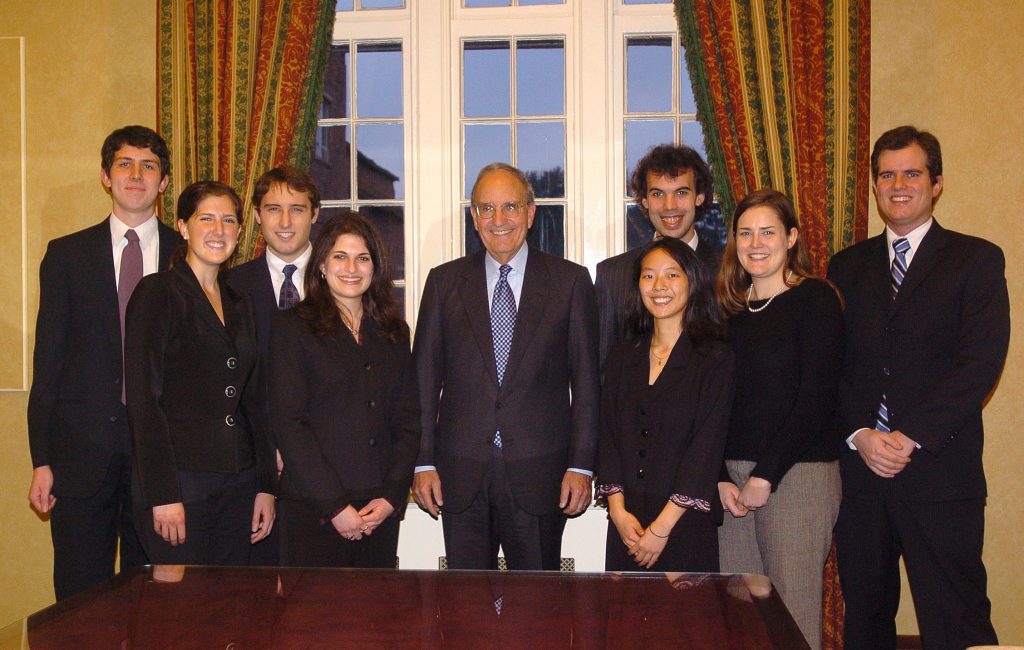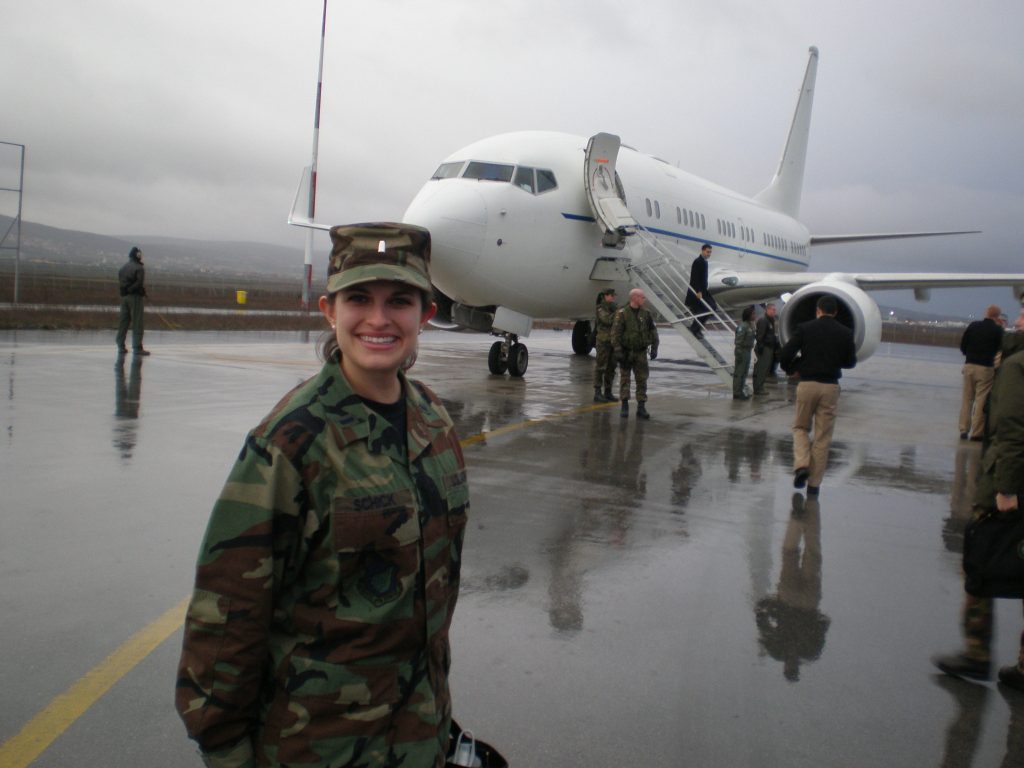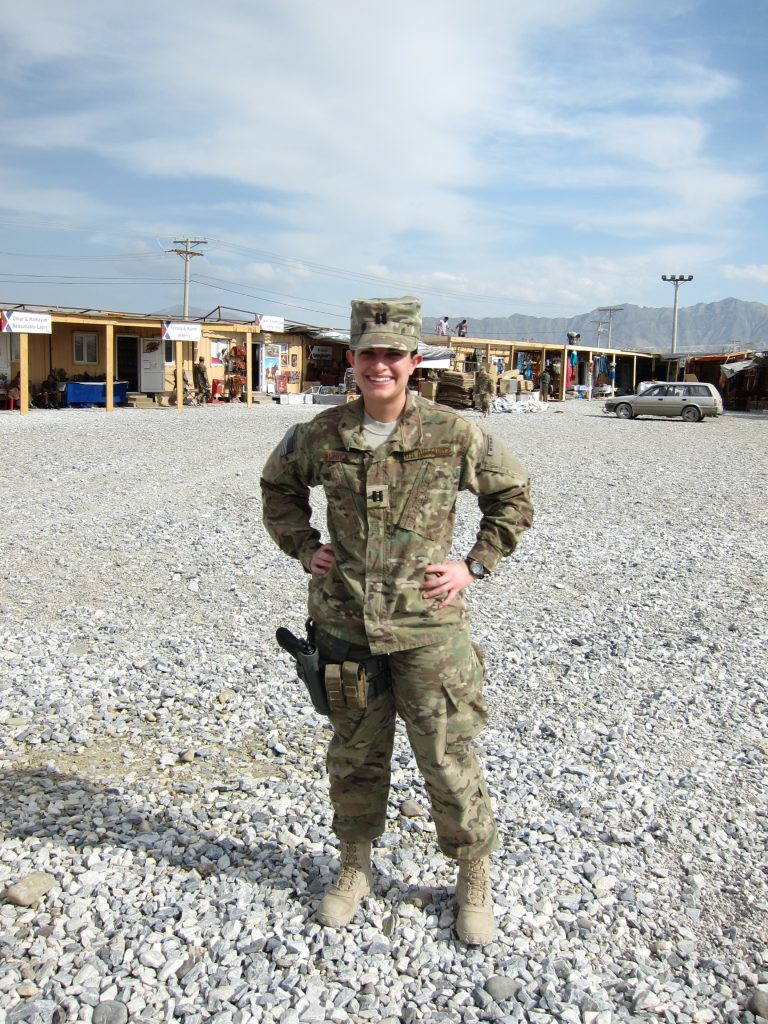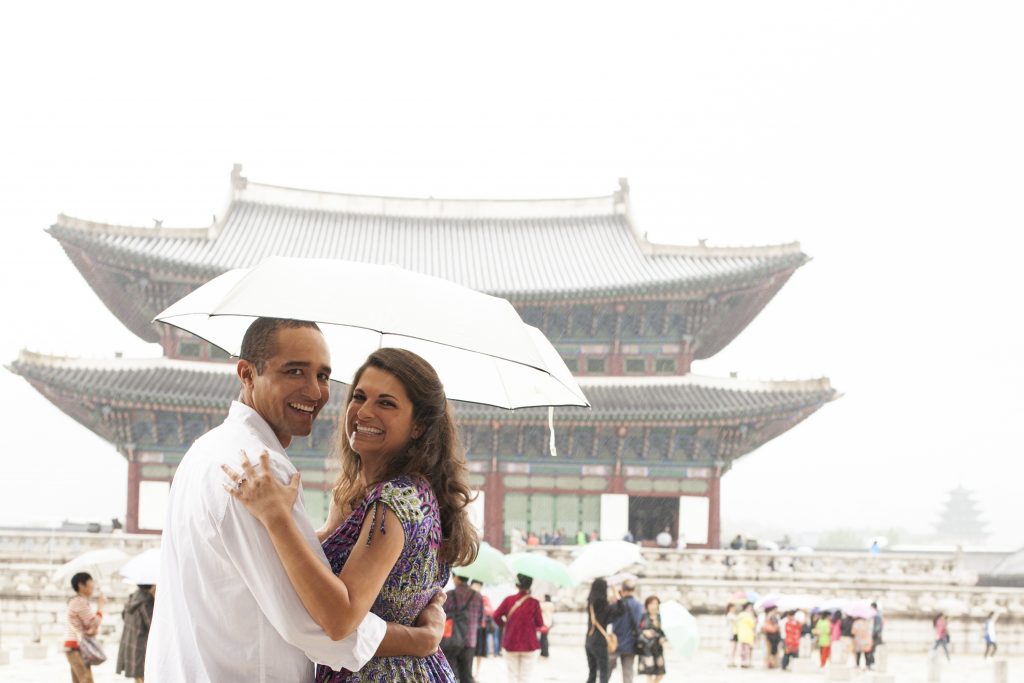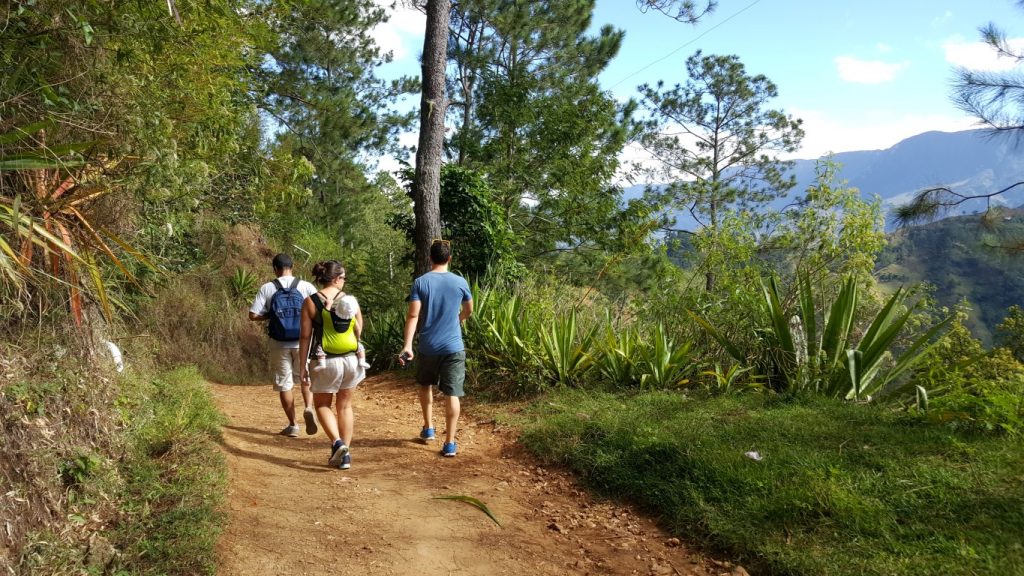Brittany graduated from UCI in 2005 having double majored in Political Science and International Studies with a focus on Western Europe. A graduate of the UCLA ROTC program, she commissioned as a Second Lieutenant in the U.S. Air Force in 2005 as well but delayed her military service one year so she could study for her M.A. in International Security and Conflict Studies at Dublin City University as a George J. Mitchell scholar. Following her year in Ireland, Brittany returned to the U.S. for a year of training as an intelligence analyst in the Air Force; she subsequently used those skills in an eight year Air Force career, with postings in Korea and Belgium, as well as deployments to Afghanistan and Africa. In 2014, Brittany joined the Foreign Service and has been posted to Haiti and Brunei. Along with her husband and daughter, Brittany is currently serving as the Deputy Political, Economic and Consular Chief at the U.S. Embassy in Bandar Seri Begawan, Brunei, where she works on an array of issues, including human rights, religious freedom, and international trade.
********************************************************
Brittany Schick, UCI’s first Mitchell Scholarship winner, received her bachelor’s degrees from UCI in Political Science and International Studies in 2005. She pursued a Master’s degree in International Security and Conflict Studies at Dublin City University through the Mitchell. Her long-term goal was and has been to work in the intelligence community.
The US-Ireland Alliance is a non-partisan, non-profit organization dedicated to consolidating existing relations between the United States and Ireland. Brittany knew she wanted to study for her Master’s overseas and she was really interested in using the N. Ireland conflict as a model for other conflicts in the world, so this was a major factor in pursuing the Mitchell and Ireland.
“Mitchell scholars leave a footprint and have a lifelong impact on Ireland, “states Schick.
“Having an understanding of the culture and the history of conflict there has been helpful for my work, not only in my work with other Europeans in organizations like NATO, but also in my work now as a diplomat.”
How did the Mitchell opportunity prepare you to make an impact, not only in Ireland, but in the world and in your own career path?
“Academically, I think being part of a security and conflict program that was so multi-national, i.e. included the perspectives of many diverse nations, has been really helpful in my work with NATO and now as a diplomat. Personally, I really must credit the Mitchell with providing some of my closest friendships and professional contacts, which is of course a huge part of daily lives and cannot be underestimated.”
You have been the only Mitchell recipient at UCI. What was your major at UCI and how did learn about the Mitchell? What inspired you to apply?
I was majoring in political science and international studies with a focus on Western Europe. I was part of the Campuswide Honors Program and they had a program to help students apply for prestigious scholarships, like the Fulbright, the Truman and so forth. I actually applied for a few of them, but the Mitchell is the one I received and in retrospect it really was the best fit for me. I was working with Audrey DeVore and Rebecca Harris back when they worked there in the Campuswide Honors office.
Why the Mitchell? Why study in Ireland?
I was focusing on Western Europe in my studies and the summer between my junior and senior year I was part of a study abroad program, the first cohort to go do an exchange with the University of Lund in Sweden. And now, more than 10 years later, that exchange continues. Students from all the UCs went to the University of Lund; we took classes with Lund students and we had both UC professors and University of Lund professors. It was different from most international exchanges because the focus was more on politics, rather than on language or culture.. Our focus was mostly on the politics of Europe and the European Union. During the program we took a trip to Brussels and, among other places, got to visit EU headquarters and NATO headquarters.
We also went to Stockholm and met with members of the Swedish government. So, it was a really interesting program and was the first time that I got to spend a significant amount of time in Europe, which helped solidify my desire to come back and do my Masters in Europe. So this experience led me to apply for the Fulbright in the UK, as well as the Mitchell to study in Ireland or Northern Ireland and it ended up working out for the Mitchell.
How did you sell your point in your personal statement? What do you think made you stand out?
The program was still relatively young. 2001 was the first graduating class of Mitchells.
The U.S.-Ireland alliance administers the Mitchell program, which allows American leaders to pursue a year of graduate study in Ireland and Northern Ireland. The goal is to provide future leaders with an understanding and interest in Ireland. The Alliance was created by Trina Vargo in 1998. She had worked with Senator Mitchell to create a program that would deepen that U.S.-Ireland alliance. So, basically, the scholarship was the main place holder in that alliance.
Being a young program back when I was applying in 2005 (2001 was the first graduating class of Mitchells), they hadn’t had a lot of candidates with military background, service academy experience, or anyone who was part of an ROTC program.
I was one of the first females accepted into the program who was also pursuing a future in the military. I think my ambition to combine my academic study with a military career, specifically serving overseas within the intelligence field, was part of what made me a relatively unique candidate for the scholarship.
Tell me about your military background and UCI? What came first?
During my four years at UCI, I was also a cadet in the Air Force reserve officer training corps (ROTC) program up at UCLA. ROTC is basically, one of three ways someone can earn a commission and become an officer in the U.S. military. So when I graduated from college, I commissioned the same week, became an officer, and was granted an administrative delay from the Air Force, which essentially allowed me to take advantage of the Mitchell scholarship.
I served in the Air Force for eight year after graduate school and am currently in the inactive ready reserves, which means I maintain my commission as an officer but am not actively serving in the military.
How did you juggle ROTC duties with UCI demands?
It was really hard. That’s the reason that I got a “C” in honors micro-bio. I remember I was in the Campuswide Honors Program and had to do ROTC every Friday, so I was gone from Irvine and forced to miss classes every Friday. I was lucky enough that I was able to schedule most of my classes Tuesday/Thursdays or Mondays and Wednesdays, but there was this one required micro-bio class that was M/W/F and I found it impossible, having missed 1/3 of the classes, to do well.
UCI is so intensive. It almost requires a full-time commitment to the space.
Yes, it definitely does. Being first to register for classes because of being in the CHP program gave me that edge to accommodate a crazy schedule. It was hard. I double-majored, and technically, could have triple-majored because I was taking classes up at UCLA, like Aerospace studies, history and classes that were specific to ROTC affairs. I ended up graduating with so many units that it was enough for a triple-major.
It would suffice to say that through my college years, I didn’t work during the school year; there just wasn’t enough time.
What ended up being your double-majors at UCI?
Political Science and International studies.
I didn’t get a degree from UCLA, I just completed my ROTC requirements there. ROTC detachments are located all over the United States and allow cadets to come to that university, even if they’re not a full-time student there, just to fulfill their ROTC obligations in order to earn their commission, which means taking military studies classes and otherwise participating in the ROTC program. The degree, at UCLA, in my case, was getting a commission in the United States Airforce and becoming an officer upon graduation.
And, since I get this question a lot, in order to an officer in the U.S. military, yes, you must have a bachelor’s degree.
Why did you choose UCI?
I grew up outside Chicago and when I started looking at universities I was drawn to ones far away from home. I think, like a lot of teenagers, I wanted to have a different experience. My aunt and uncle lived in Yorba Linda and we used to come out on vacation, so I knew I loved the area. I knew that the University of California was the #1 public school system in the country, so I went out there and looked at a few of the UCs in that area. I remember coming onto the Irvine campus and walking out to Aldrich Park and it was so calm and peaceful that I just knew I’d be at home there.
Once UCI endorsed you for the Mitchell, where did you go for the interview?
I went to Washington DC.
Tell me a little bit about that process. What kind of questions did they ask you?
Back then, they were still doing semi-finalist interviews in person. I understand they have now changed that. So I flew out for that. A couple of days later, I found out that I was going to be a finalist and then I had to fly out a week later for the final interview. Literally the day after the final interview I found out that I had received the scholarship.
The semi-finalist interview was just an interview. There were just two people I met with. When I did the finalist interview, the whole process started the night before the actual interview. There is a reception, usually at the Irish Embassy in Washington D.C,. And you are there with all of the other finalists and with the people who will be part of your panel the next day, but you don’t know who they are.
It’s all part of the process. The Irish Ambassador is usually there, so it’s formal but not an intimidating event. The Mitchell interview process is meant to be an opportunity to let you talk in a more natural atmosphere and see if you are the type of person who can handle this type of situation because they look at you as essentially being an ambassador of the U.S. abroad.
The next day they do the finalist interviews. They had a panel of interviewers, about 9 to 12 people on the panel; it was a huge panel. You walk in and you are like, “Wow! This is a lot of people.” But it’s not an aggressive interview. They are not trying to trip you up. You still need to know your stuff. Everyone takes turns asking you questions. It’s a thorough interview, but it is also fast-paced, about 20 minutes.
What do you mean by, they will expect you to know your stuff?
They will ask you questions about your experiences and details in your application. They will ask you, why the Mitchell? Why Ireland? To get to this point in the application process you need to have identified the what, why and where in Ireland. They will ask you about that.
The reason for these specific questions is that lots of people will want to say that they got this prestigious scholarship, but the question for the committee is, has this applicant really thought it through? Interviewers are trying to gauge whether the candidate is really interested in the U.S.-Ireland relationship or just looking for opportunities to study abroad.
Are you just chasing the accolade, or do you have a really good reason for why you want to pursue this specific opportunity?
What did you tell them?
I was interested in the Northern Ireland conflict; specifically, how they resolved that conflict. I ended up doing my dissertation on a comparison between the IRA in Northern Ireland and Hamas in the Palestinian Territories and Israel. I was interested in comparing how the populations supporting both of those groups influenced their tactics.
It sounds like you wowed them with your knowledge of the political climate and the contemporary issues.
I think they appreciated that I had done my research on Ireland and why I wanted to study there. Also, generally speaking, they appreciate candidates who are well-rounded. They are not just looking for a 4.0 GPA and candidates who just have a stellar academic record. They want you to have community service, and leadership experience, and a certain type of personality – someone who can speak comfortably and be articulate. Not just someone who is book-smart. I believe they would be willing to accept a 3.5 or 3.6 GPA if a candidate had the other qualities.
What was your experience like when you got to Ireland? What was a day in your life like?
Once the Mitchells are awarded, the program can send up to two Mitchell’s to any university in Ireland. You could have Mitchells in Northern Ireland and in the Republic of Ireland. Generally they’ll have two students at each of the best known universities, like Queens in Belfast and Trinity in Dublin. But there are universities all over the island. I went to Dublin City University (DCU), which is about 20 minutes north of Dublin. Depending on where you go, you will have a different experience. You’ll be in a different city, a different campus and naturally you are going to study different subjects, but you have an opportunity to influence all that in your application.
I was fortunate. The year I got there was the first year they had a program in International Security and Conflict Studies. When I interviewed I was going to go into a general IR program because that’s all the country had. But when I found out they’d be adding the security/conflict degree I asked for permission to go into that instead and they approved it.
DCU ended up attracting students from all over the world for this particular program and it was wonderful. There was one student from Nigeria; there were a couple other classmates from the United States; there was a classmate from Spain. I thought it was a great program because you didn’t just have the Irish perspective. When you talk about a topic like international conflict it is always great to have people from several perspectives and different continents share their views. I’m actually still friends with one of the great Irish girls who was in the same program.
The most enduring relationships that I created were with my fellow Mitchells. Several of us have stayed in touch. We’ve gone on vacations together, our kids play together, one of them was even in our wedding party! . In fact, I’m going over to one of their homes for brunch tomorrow! More than 10 years later, we are still very close.
This was really the best period of my life for developing genuine relationships with truly kind people who also have great careers and are really going somewhere. It was never networking in the sense of using one another to claw your way to the top. It was more like drinking beer together, talking about our classes, and catching up. We traveled all over Europe together and beyond. We had all these great, organic experiences together. And over time, since graduation, that has developed into a network of great friends who I call for everything from parenting advice to help prepping for an important interview. Most of them have gone on to get additional advanced degrees from some very prestigious universities like Yale and Harvard. They’ve lived all over: Timor Leste, Germany, Sri Lanka… They’ve traveled to some incredible places, and they’re doing everything from groundbreaking research to fighting to reduce poverty.
Given that you are our only recipient at Uci so far, where do you suggest that we recruit students who might be a great fit?
The great thing about the Mitchell, unlike many other programs, is that they take people from any field of study. You can have a dancer or a musician. We even had a guy in our class who was a firefighter. If they can articulate why they want to study in Ireland, any major is eligible for this program. It’s not just political science or international studies. I’m not sure where it’s ranked now, but I know when I went to UCI the dance program was 2nd in the nation and I’d be surprised if students in the fine arts realize that opportunities like the Mitchell are available to them. I would say you can also definitely recruit through the campuswide honors program because you’ll find students there with strong academic backgrounds, which of course is a must for a scholarship like this. Students who are strong academically, diverse, articulate, well-rounded and leaders will be solid candidates.
In the application there is a space for the candidate to identify the top three universities and programs they’re interested in. It would be good for applicants to do their research on both because if theyget to the interview point, they’ll need to be able to articulate that.
In looking up your biography, you’ve lived in Haiti and Korea. Can you tell me about that?
Currently, I am a Foreign Service officer with the State Department. I lived in Haiti for two years where I worked as a Counselor Officer. I worked in the immigrant, and non-immigrant visa units, as well as American Citizen Services. I interviewed applicants for visas, whether it was for leisure, business, or study. I also conducted interviews for those who were in the process of legally immigrating to the United States.Working in American Citizen Services was a bit different – probably the most interesting part of the job! It wasn’t just helping Americans who had lost their passport, it was everything from prison visits to helping U.S. Citizen parents transmit citizenship to their foreign-born children. I’m proud to say that I now speak Haitian-Creole very well.
My husband and our daughter and I have just arrived in Brunei in Southeast Asia, where we will be for the next two years. It’s a small embassy here so I will sort of be in a ‘jack of all trades’ position working on political, economic, and consular issues.
Tell me about your Korean experience.
I lived in Korea back when I was in the Air Force. I loved living there; really, I love Asia in general, which is largely why we’re back in Asia now. My husband and I actually met when we were both posted in Korea. We loved the culture and the people. We lived outside of Seoul, and we found that area to be so vibrant; an incredible juxtaposition of modern technology and traditional lifestyles and architecture. Six years after we met he took me back to Korea to propose and surprised me with engagement photos at one of our favorite locations up in Seoul!
What was living in Belgium like? What did you do for NATO?
I was also posted to Belgium, where I worked as an intelligence analyst at Supreme Headquarters Allied Power Europe (SHAPE), which in simple terms is NATO military headquarters
Following that, I was deployed multiple times while working for Air Force Special Operations Command. I had a deployment to Afghanistan and another based out of Stuttgart, Germany, which was focused primarily on work related to Africa. As you would expect, being deployed isn’t easy; you’re working 12+ hour days every day the whole time, so it’s a pretty grueling pace. I guess it was good training for becoming a mom, haha.
Timeline of Brittany’s Journey:
- UCI/UCLA/ROTC – graduated and commissioned in June 2015
- Mitchell year in Ireland, 2005-2006
- 2006-2010, active duty officer in the Air Force (training, Korea, Belgium/NATO)
- 2010-2013, reservist in the Air Force (multiple deployments), I was also working for Booz Allen Hamilton in DC during this time, but we didn’t really talk about that.
- 2014-current, Foreign Service Officer (diplomat) with the State Department (training, Haiti, Brunei)
Now we have a one year old. She’s our sweetie.
What dreams do you have for her? What do you hope for her?
Everyone hopes that their child grows up with more opportunities that they had. My dad passed away when I was a kid. As simple as it sounds, l hope our daughter grows up with both of her parents. My husband and I have been actively trying to give her the gift of language because neither of us grew up bilingual. Her first language was actually Creole.
If I were to ask you now for final words of advice for students contemplating the Mitchell what would you say to them?
I would say, just apply. I applied for many scholarships that I did not receive. But I would say that going through these experiences prepared me for the next opportunities. I think many times we are afraid of risking failure. But life, ultimately, is experiences. Everything is meant to prepare you for the next thing and to make you a stronger person. Even if you don’t make it all the way, do it for the experience. I just don’t think you can go wrong with applying for a prestigious scholarship. You’ll always have that experience to draw from in the future.

